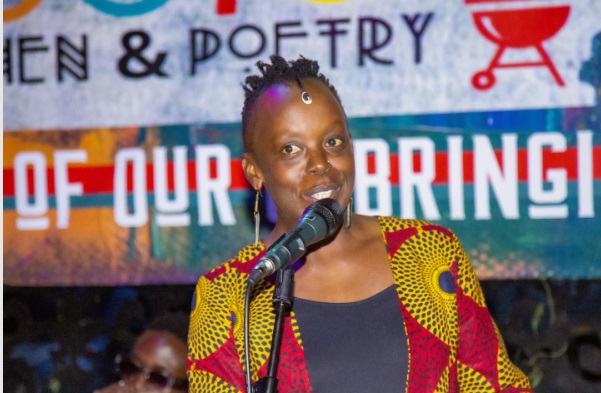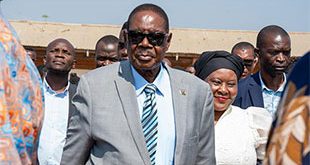
Known as “The Kenyan Poet”, Njeri Wangari is recognized for her pioneering work in African poetry blogging. Wangari’s journey into poetry began in 2004, coinciding with the emergence of spoken word performance in Kenya. She is considered one of Africa’s first contemporary poets and one of Kenya’s earliest spoken word artists.
SPECIAL REPORT | BIRD AGENCY | When Njeri Wangari walked into the spotlight at an event in Nairobi in May, it was clear she had command of the stage. The DJ cut the house music right on time and Wangari launched into her lines of poetry at the open mic event.
With her brightly patterned kitenge kimono and commanding voice, Wangari wowed the Mother’s Day crowd, with the audience snapping their fingers – considered clapping in spoken poetry circles – in all the right places. She finished her performance with another spoken word piece celebrating women and mothers, to which she received a standing ovation from the crowd – including her kids, who had tagged along.
According to her website, Wangari, 43, is “that woman who, in a room, will be having animated conversations peppered with hearty laughter.” It goes on to describe her as a person who thrives on the presence of an engaged audience where large crowds feed her energy. Spot on for someone who goes by the title of poet, storyteller and communications strategist.
Wangari was raised by her single mother with her grandmother who was an avid storyteller and one who ingrained in Wangari a passion for storytelling.
“I grew up around stories, my grandmother loved telling stories, and so now when I started interacting with stories in the form of storybooks in primary school, I realised, these are the same stories my grandmother was telling me!” she remembered.
“In the Kikuyu culture, there are lots of stories of marimo, ogres, and so a lot of those stories I grew up listening to her tell me, and then I would interact with those stories in the form of storybooks,” she explained.
It wasn’t just lessons in storytelling that she was receiving. Her grandmother would narrate these stories in Kikuyu, Wangari’s mother tongue, which instilled in her a fascination with languages and identity, and which would later become a recurring theme across her work.
Wangari also became adept at learning new languages, something she discovered at school.
“And so, I think in primary school, when I was learning English, I realised that I really had a fascination for language, I’d pick up very fast.”
Her interest in language morphed into storytelling. Then, at high school, she first interacted with poetry in its pure form.
“I interacted with poetry by Marjorie Oludhe Macgoye, Joseph Rubadiri, Okot p’ Bitek, and that just blew my mind! I loved the way poetry was able to convey such deep themes, used such beautiful ways of conveying messages that were not in your face, they were not spelling out everything, it was up to you to figure it out.”
It was this deep appreciation of poetry that in 2004 propelled her to start a blog dedicated to poetry. This soon gave rise to her popular moniker, The Kenyan Poet.
In her professional life, Wangari worked as an IT specialist for an internet service provider. While balancing her creative and professional life proved tricky, on the flipside, her work gave her access to the internet, which was limited at the time. That access helped her in her blogging journey. Publishing her poetry online opened her up to performance.
Twitter, now X, had just been launched and Wangari used this platform to connect with other poets for poetry events which were not so many back then. One such platform was Kwani! Open mic spearheaded by the late Binyavanga Wainaina.
“Back then, there was only one platform that was available, Kwani!. So Kwani! had an open mic every first Tuesday of the month where I had my first ever stage to be on and perform,” she reminisced.
Kwani! became a place where she honed her skills through mentorship and the opportunity to diversify her art form. She could write and perform in English, Kikuyu, and in Kenya’s special township slang, Sheng. She was not confined to language, structure or performance style, which was very important to her.
“That (Kwani!) became a very important platform for me to hone my skills, because there hadn’t been any other platforms to perform apart from music festivals and also because Kwani!, the publication itself, was anti-establishment,” she said.
Margaretta wa Gacheru, a veteran journalist and one of her earliest mentors, supported her storytelling journey and artistic pursuits.
“I think she’s much of the pioneer, a very progressive woman, enlightened and a go-getter. She’s not a follower. She’s a leader. And she has charisma which attracts people to her,” wa Gacheru explained.
In time, Wangari left her IT career to focus and expand on her poetry, which provided a foundation for her as a storyteller and later led to the founding and establishment of her communications firm, WangariPR.
“I would succumb to people’s need to box me. Like I need to be in a neat box where people know how to define me and I was struggling with that because I love all these things.”
“For me they make sense because I see the thread that weaves through all of them. When I’m doing an article, I’m a freelance journalist; when I’m writing a poem and I’m performing it, it is also a story; just different mediums, different packaging for different audiences,” she explained.
It is through this ‘going back to basics’ as she puts it, that AfroKidz was born. KenyaBuzz describes AfroKidz as a ‘socially conscious venture that is reshaping the way children engage with their roots.’
“I am passionate about storytelling, about African languages, and I am passionate about our history and our culture. And now I’ve been able to find a separate avenue for my love for storytelling for children because that’s a space that I feel, having three young ones, that they’re not enough storybooks for African children,” she explained.
“I have hung ups from my childhood. I grew up at a time when the only stories that were available were Cinderella, Little Red Riding Hood, Rapunzel and those things gave me trauma,” she reiterated.
At AfroKidz, Wangari uses storytelling in various forms including poetry, flashcards, and stories to teach and help kids appreciate their culture and identity. She was also driven by the fact that she was now a mother and very intentional on the type of content her kids consumed.
“My husband and I have always been very intentional about the kind of stories that we read for them or find for them and so that’s how AfroKidz came about.”
Afrokidz birthed Tusome Hadithi, a storytelling podcast where African children’s stories are told in audio/video format.
Paying homage to her first love, and a product of mentorship as well, Wangari mentors spoken word artists, some of whom have grown and created their own niche such as Dorphanage, a Nairobi-based spoken word artist.
“I was hungry for excellence, to learn. And that, especially from the people who came before me,” he said of Wangari.
Dorphanage’s work is deeply inspired by African culture and the question of identity, something they share with Wangari.
“Our works are similar; our love for Africa, our love for culture, and then our love for people and their struggles. My work is a reflection of that a lot.” he reiterated.
Beyond her artistic pursuits, Wangari is an avid recreational runner as seen on her website where she creates stories on the same. It’s this passion that inspired #PoetryPlacards, which she describes as “running placards and signs with homegrown punny, funny, inspirational Kenyan messaging.”
She has also been coining motivational quotes which she designs using photos of Kenyan elite and recreational runners.
“It was just an observation that I had been making over time that, as Kenyans, we are known for running, but if you were to do a Google search of running quotes, you will not find any apart from one from Eliud Kipchoge, ‘no human is limited’”.
The placards started as motivational quotes before she made them relatable with “Kenyanised”, funny, quotes.
“I am a storyteller at the end of the day. I needed to be very creative about the way that I’m going about the storytelling.” she said smiling.
Wangari hopes for more collaborations in the future, she is also looking to publish some children’s books as part of AfroKidz.
****
SOURCE: Esther Musembi, bird story agency
 The Independent Uganda: You get the Truth we Pay the Price
The Independent Uganda: You get the Truth we Pay the Price




I am am a journalist Opio Emmanuel in need of sending videos from Northern Uganda that has never been sent, but how much do you pay per story and videos.
Opio. Thank you for the note. Considere sending the videos to a broadcasting house.
Here is a contact
e’re on the lookout for content creators and journalists who are passionate about telling stories that shift stereotypical narratives about Africa.
We are also engaging with digital publishers who would like to publish (free to African platforms) bird content.
If you are a multimedia content creator and happy to sign a code of conduct and ethics, do send a resumé and a portfolio of written and visual content to birdcommed@africainsight.co.ke.
If you are an African digital media publisher and would like to publish bird content, please contact bird@africainsight.co.ke